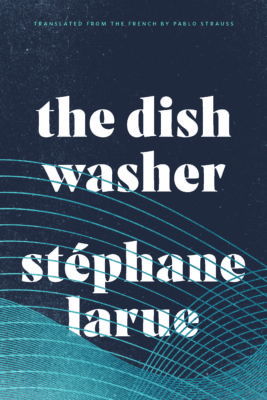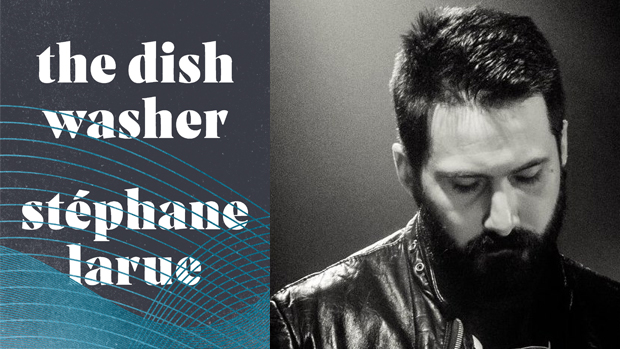I used to wash dishes at a small casse-croûte. The burly cook was a veteran of Montreal’s fine-dining world and would tell me stories from his time in some of the city’s most venerated kitchens. Chefs’ power trips, heavy drug use, intense physical and mental stress, and close encounters with organized crime were all common. I was shocked that he put up with such terrible working conditions. He simply shrugged. For many young culinary workers it was taken for granted, but after hearing his hair-raising stories I knew I could never cut it in the late-night restaurant world.
Stéphane Larue’s The Dishwasher takes us deep into that world. Set in the belly of a high-end Montreal restaurant at the turn of the millennium, the novel is narrated by an unwitting nineteen-year-old plongeur who has just started his first job in a professional kitchen. Larue’s prose is expertly infused with the sights, smells, and exhausting physical labour of the job as our narrator learns the ways of the dish pit and navigates the complicated relationships of his new workplace. In his off-hours, he fights a gambling addiction that has landed him in trouble and tries not to flunk out of CEGEP. At nineteen, he feels his life is falling to pieces. He finds solace in heavy metal, which provides a propulsive soundtrack to the novel as he blasts mixtapes of Iron Maiden and Slayer on his walkman in the metro and at work.

The Dishwasher
Stéphane Larue
Translated by Pablo Strauss
Biblioasis
$21.95
paper
424pp
9781771962698
The Dishwasher is powered by Larue’s kinetic, heavily descriptive writing. Quoting short extracts would not do it justice – it is the accumulation of detail over several galloping pages that creates immersive scenes of sensory and affective precision. Through descriptions of the frenzied kitchen night after night, the reader is drawn into the routines of the restaurant, its volatile energy, and extreme personalities. With a less skilled writer this could have become repetitive, but one of the pleasures of the book is how Larue manages to keep these scenes fresh, introducing a rich cast of secondary characters and making each night feel somehow both the same and completely different.
“I think that feeling of freshness,” Larue tells me, “resides in the basics of building a good scene. In every one of these scenes, we had to learn something new about the restaurant, something new about each character; we had to feel the general dramatic crescendo of the story ratcheting up. It was like writing mini action-packed movie scenes where, instead of guns and explosions, there are frying pans, pizza ovens, and steam pots full of chicken carcasses.”
Every action movie needs a great soundtrack, and for The Dishwasher, the cacophony of the kitchen bleeds seamlessly into the wails of classic heavy metal. A true metalhead and budding illustrator, our narrator is thrilled when he is hired to create the cover of a local band’s debut album. But when the band pays up front, the money disappears into video lottery terminals and the commission hangs over his head as he struggles to crawl out of debt.
Larue, himself a “die-hard metal fan,” skilfully weaves authentic references to heavy metal culture through the novel. Specific songs and albums play in the background. The protagonist visits Cité2000, the legendary rehearsal studio of generations of aspiring Montreal metal bands. He finds common ground with an older busboy who tells him about seeing Slayer at the Verdun auditorium years earlier. He headbangs in the crowd (“like a sea of orks in Helm’s Deep”) at a lovingly described Megadeth concert: “There was no up, no down. I couldn’t tell where my body ended; I’d become part of this rocky, roaring wave of sound and sweating bodies. The entire Métropolis was shaking.”
Beyond the references, the broader influence of heavy metal is apparent in Larue’s craft as a writer. Throughout the novel, the intensity of the dish pit is paralleled in the mosh pit, and his writing mimics that propulsive motion on the page. It is something he worked hard to achieve, “imbuing the narrative with the same rushing energy” as the music his protagonist loves so much.
The Dishwasher builds on an esteemed tradition of autofiction in Francophone literature. Born in Longueuil in1983, Larue studied comparative literature at Université de Montréal and, like the protagonist of his book, began working in Montreal restaurants in the early 2000s. He is clear about both the real-life inspiration behind the novel and how he shaped it into narrative form: “If plenty of events depicted in the book could be described as ‘true events’ – and that’s really what they are – they’ve at the same time been fictionalized to suit the dramatic needs of the story I wanted to tell. I think that’s what many novelists do. They write about real events, they use fiction to make novels out of those events, and, in the end, they make those true events feel truer than they initially felt.”
One of the book’s triumphs is how it captures the organized chaos of Montreal nightlife in the early 2000s. Taken under the wing of a chef named Bébert, after each shift the protagonist is led through the city’s boîtes and bars, from the seedy Roy Bar to the after-hours Aria, where kitchen staff blow off steam and drink to excess. Despite the passage of time, Larue did not find it difficult to recreate those years. We tend to remember “firsts” with “a rare kind of precision,” he reminds me. “These memories shine with a special brightness.” He continues: “My first years in the restaurant industry, my first years living the Montreal nightlife, have that kind of brightness. When I sat down to write about that period, it came back very easily and clearly.” The result is a remarkably familiar glimpse of the recent past.
Pablo Strauss’s translation loses none of the urgency or joual grit of the original text. Larue notes that the Montreal vernacular “was an interesting challenge for translation. Certain expressions needed creativity and reflection to be translated correctly.” He enjoyed working with Strauss and in the end is confident that his protagonist’s voice is consistent across both languages and that the all- important “early 2000s Montreal feeling” of the novel has remained intact.
For his part, the Quebec City-based Strauss drew on his own years working as a dishwasher to inform his translation of Le plongeur. Translators often work on topics they know little about, but he came to this project with a specialized vocabulary and a familiarity with spaces and people similar to those in Larue’s book. As he told me, in a fitting culinary simile, “It’s a bit like the difference between following a recipe for something you’ve never cooked before, and preparing a favourite dish you’ve made a hundred times.”
The novel’s ending crashes down like a hangover after a night of hard partying, and the protagonist emerges from his time in the greasy suds utterly changed. The Dishwasher is a gripping tale of unlikely friendships, a romp through the underworld of late-night Montreal, and a blazing thrash metal ode to the heart of every restaurant, the humble dish pit. mRb







Sounds amazing. Thanks for this review and prelude to a flashback.
The review reflects very well what happens in the book and its mood. Well done. Dive into the book (pun intended) and enjoy it.